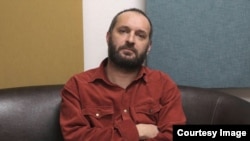An encounter with police in the Serbian city of Pirot earlier this year unnerved investigative reporter Slavisa Milanov.
A journalist for the independent media outlet FAR, Milanov was driving with a colleague in February when they were pulled over by police, who asked the pair to accompany them to a station to be tested for illegal substances.
Once there, Milanov said he was asked to leave his phone and personal belongings behind during a check.
The drug tests were negative, but when police handed Milanov his phone, he noticed the settings had been changed.
Suspecting that spyware may have been installed, he reached out to Amnesty International.
In a report published this week, the international watchdog confirmed Milanov’s suspicions, finding forensic evidence that spyware was installed on the phones of several journalists and activists, including Milanov.
In at least two cases, software provided by Cellebrite DI — an Israeli company that markets products for government and law enforcement agencies — was used to unlock the phones prior to infection, the report found. Then, Serbian spyware called NoviSpy took covert screenshots, copied contacts and uploaded them to a government-controlled server.
“In multiple cases, activists and a journalist reported signs of suspicious activity on their mobile phones directly following interviews with Serbian police and security authorities,” Amnesty said.
'Major consequences' seen
Aleksa Tesic, who has reported on spyware in Serbia for the Balkan Investigative Reporting Network, said the Amnesty report precisely documented for the first time cases showing technology abuse for the purpose of affecting civil liberties.
"We had various indications that this was happening before, because Serbia has been interested in advanced spy software for more than 10 years. But this could now have major consequences for democracy in Serbia," Tesic said.
Serbia’s Security Intelligence Agency (BIA) rejected the findings. In a statement on its website, the agency said the report contained “nonsensical statements,” and that the BIA operates within local law.
The Serbian Interior Ministry also denounced the report as incorrect.
Milanov said the existence of spyware on his phone could “jeopardize me, my family, colleagues and my sources.”
“If anything happens to any of us, I will hold the state responsible for it. I don't see who else it could be,” he told VOA Serbian.
Milanov is based in Dimitrovgrad, at the border of Serbia and Bulgaria, 330 kilometers from Serbia’s capital, Belgrade. He recalled to VOA the traffic stop and police headquarters, where he believes his phone was accessed.
“There, I was told to turn off my phone and leave other personal belongings during the check. Alcohol and drug tests were, of course, negative. Yet the policeman was, as it seemed to me, messaging with someone unknown to me,” Milanov said.
The reporter asked if he was free to go but was told, “We are waiting for the boss.”
Not long afterward, two men arrived. Milanov said they did not identify themselves.
“I assumed they were police inspectors. We went to another police station, where they questioned me about my work, financing, if I have traveled to Bulgaria recently and with whom,” he said.
Milanov answered the questions before being released with his belongings.
But changes to his phone settings led to a suspicion that something was wrong.
At home, he used specialized software and found that although he had left his phone off at the police station, it had been switched back on for the duration of his police encounter.
Call for accountability
Pavol Szalai, who heads the European Union-Balkans Desk of Reporters Without Borders, told VOA that Amnesty’s report corroborates information his organization had about journalists targeted by surveillance.
“Spyware and surveillance used in an illegitimate way kills journalism without spilling [any] blood of a journalist. Surveillance undermines confidentiality of sources, which is a cornerstone of press freedom,” he said. “And as for Serbia on the international level, it must be held accountable by the international organizations of which it is a member.”
Serbia is a European Union candidate country. But a report this year by the European Commission said the country lacked progress, including in the rule of law, the fight against corruption, nonalignment with Russia sanctioning and media freedoms.
A European Commission spokesperson told VOA that any attempts to illegally access citizens’ data, including journalists and political opponents, if confirmed, are not acceptable.
“The commission expects national authorities to thoroughly examine any such allegations and to restore citizens’ trust,” the spokesperson said.
U.S. State Department spokesperson Matthew Miller said that while he could not comment on a specific case, the use of spyware raises concerns.
“Speaking broadly, we have made quite clear since the outset of this administration the concerns that we have about governments that use spyware to track journalists, to track dissident groups, to track others who legitimately oppose or report on government activities,” Miller said in response to a question by VOA.
Grant Baker, a research analyst for technology and democracy at Freedom House, said Serbia should conduct an impartial investigation and provide remedy to those affected.
“Authorities should also amend excessively broad laws regulating surveillance so they better align with both the European Court of Human Rights rulings and the International Principles on the Application of Human Rights to Communications Surveillance,” Baker said.
The international community should also “make clear that such disproportionate surveillance is a grave threat to democracy,” Baker said.
“While export controls are not a panacea, they are one important and necessary step to reducing the technology’s negative impact on human rights around the world,” he said.
Serbia has a vibrant media landscape, but reporters often face political pressure, and impunity for crimes against journalists tends to be the norm, according to press freedom groups.
Reporters Without Borders ranks Serbia 98th out of 180 on the Press Freedom Index, where 1 reflects the best environment for media.




